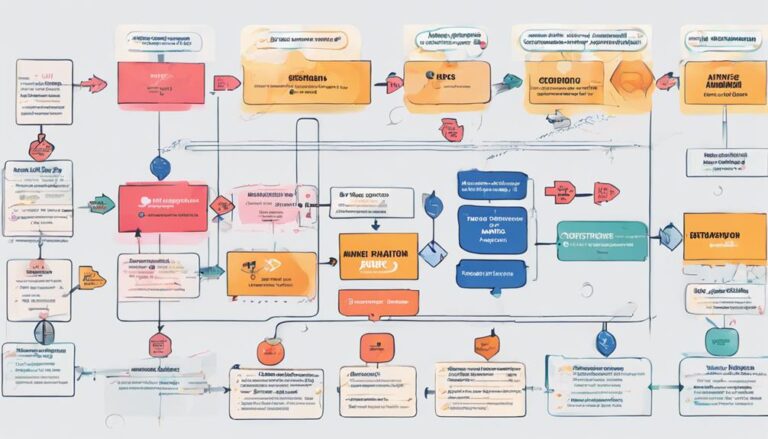The Impact of AI on Healthcare Sales and Marketing
AI is revolutionizing healthcare sales and marketing by enhancing customer relations, refining strategies, and streamlining processes. With AI, anticipate tailored communication channels and predictive insights to effectively forecast needs. Data-driven strategies leverage AI for precise audience targeting and personalized messages, boosting lead generation potential. Immerse yourself in enhanced patient engagement, automated sales workflows, and optimized pricing strategies for a competitive edge. Virtual assistants will improve customer support and compliance monitoring. Embrace the power of AI for revenue growth and operational efficiency in healthcare sales and marketing. Explore the myriad possibilities AI offers for elevating your healthcare sales and marketing strategies.
Key Takeaways
- Enhanced customer relationship management through AI technology.
- Data-driven marketing strategies refine targeting and messaging.
- Personalized patient engagement with AI algorithms and predictive analytics.
- Automation streamlines sales processes, boosting efficiency.
- Predictive analytics optimize sales forecasting for proactive decision-making.
Enhanced Customer Relationship Management
Incorporating AI technology into customer relationship management systems has revolutionized the way healthcare sales and marketing teams engage with clients and prospects. AI-driven insights now empower these teams to personalize interactions based on individual preferences and behaviors, leading to more effective customer retention strategies. By analyzing vast amounts of data in real-time, AI can predict customer needs, optimize outreach efforts, and tailor communication channels for maximum impact.
AI-driven insights enable healthcare sales and marketing teams to anticipate and address client needs proactively. These insights help in identifying patterns that indicate the likelihood of a client churning, allowing teams to intervene with targeted solutions. Additionally, AI facilitates the automation of routine tasks, freeing up time for sales and marketing professionals to focus on building stronger relationships with clients.
In essence, the integration of AI into customer relationship management systems equips healthcare sales and marketing teams with the tools needed to deliver personalized experiences, enhance customer satisfaction, and drive long-term loyalty.
Data-Driven Marketing Strategies
By harnessing AI-driven insights from customer relationship management systems, healthcare sales and marketing teams can strategically implement data-driven marketing strategies to optimize engagement and conversion rates. Machine learning and data analytics play a pivotal role in refining these strategies, enabling organizations to make informed decisions based on real-time data analysis.
Machine learning algorithms can analyze vast amounts of data to identify patterns, trends, and customer behaviors, allowing marketers to tailor their campaigns more effectively. Data analytics provides valuable insights into customer preferences, behaviors, and demographics, helping sales teams target the right audience with personalized messages and offers.
Through the use of AI-powered tools, healthcare sales and marketing professionals can streamline processes, improve targeting accuracy, and enhance overall campaign performance. By leveraging data-driven marketing strategies, organizations can deliver more relevant and timely communications to customers, ultimately driving higher engagement and conversion rates in the highly competitive healthcare industry.
Personalized Patient Engagement
To enhance patient interactions and outcomes, healthcare organizations can leverage personalized engagement strategies driven by AI insights and data analytics. By incorporating AI into patient engagement, healthcare providers can offer tailored treatment plans and remote patient monitoring, leading to improved patient satisfaction and health outcomes.
Here are five key strategies for personalized patient engagement:
- Utilize AI Algorithms: Implement AI algorithms to analyze patient data and provide personalized recommendations.
- Enhance Communication: Use AI-powered tools to engage with patients through personalized messages and reminders.
- Remote Monitoring: Enable remote patient monitoring through wearable devices and AI analytics for real-time health tracking.
- Predictive Analytics: Leverage predictive analytics to identify potential health issues and proactively address them.
- Personalized Care Plans: Develop customized care plans based on AI insights to meet the unique needs of each patient.
Automation of Sales Processes
Automating sales processes in healthcare can revolutionize how you streamline workflows and manage leads.
Utilizing AI for sales automation can greatly enhance efficiency and productivity in your sales team.
Streamlining Sales Workflows
Implementing AI-driven automation in sales workflows enhances efficiency and productivity, revolutionizing how healthcare organizations manage their sales processes. By streamlining sales workflows, healthcare sales teams can:
- Automate lead scoring and prioritization.
- Personalize interactions with prospects at scale.
- Identify cross-selling and upselling opportunities.
- Analyze customer data to predict purchasing behavior.
- Integrate CRM systems for seamless tracking and reporting.
These enhancements optimize workflows, increase efficiency, and drive revenue growth. Leveraging AI in sales processes allows healthcare organizations to focus on building relationships and providing tailored solutions, ultimately leading to improved customer satisfaction and higher sales conversions.
Enhancing Lead Management
In addition, AI tools enhance lead scoring accuracy by analyzing vast amounts of data to identify the most promising leads, enabling sales teams to prioritize their efforts effectively.
By automating tasks such as lead nurturing and follow-ups, healthcare sales professionals can focus on high-value activities, ultimately leading to increased conversions.
Moreover, AI streamlines sales pipeline optimization by providing real-time insights into lead progression, helping identify bottlenecks and opportunities for improvement.
This data-driven approach empowers sales teams to make informed decisions, allocate resources efficiently, and ultimately achieve better sales outcomes in the healthcare sector.
Improved Lead Generation Techniques
Utilizing cutting-edge AI algorithms can revolutionize lead generation strategies in the healthcare sales and marketing industry. By leveraging AI-driven lead qualification and advanced lead scoring techniques, businesses can greatly enhance their lead generation capabilities.
Here are five key aspects to take into account:
- Personalized Targeting: AI enables the segmentation of leads based on diverse criteria, allowing for personalized targeting and tailored messaging.
- Real-Time Lead Scoring: Implementing AI-powered algorithms can facilitate real-time lead scoring, ensuring that sales teams focus on high-potential leads.
- Behavioral Analysis: AI can analyze customer behavior patterns to predict future actions, aiding in the identification of promising leads.
- Automated Lead Nurturing: Using AI, businesses can automate lead nurturing processes, ensuring timely and relevant interactions with leads.
- Optimized Resource Allocation: AI's predictive capabilities help in allocating resources effectively by identifying the most promising leads, thereby maximizing sales and marketing efforts.
Predictive Analytics for Sales Forecasting
When considering predictive analytics for sales forecasting in healthcare, your focus should be on:
- Sales trend analysis
- Forecast accuracy improvement
- Data-driven decision making
By leveraging data analytics tools, you can identify patterns in sales trends to make more informed decisions.
Improving forecast accuracy allows for better resource allocation and strategic planning, ultimately leading to more effective sales and marketing strategies in the healthcare industry.
Sales Trend Analysis
In the domain of healthcare sales and marketing, comprehending sales trend analysis through predictive analytics is essential for optimizing sales forecasting accuracy and strategic decision-making. When delving into sales trend analysis, consider the following:
- Utilize Historical Data: Analyze past sales performance to identify patterns.
- Segmentation Strategies: Use market analysis to segment customers effectively.
- Predictive Modeling: Implement advanced algorithms to forecast future sales trends.
- Real-Time Monitoring: Monitor sales metrics in real-time for quick adjustments.
- Competitor Analysis: Compare your sales trends with competitors for a competitive edge.
Forecast Accuracy Improvement
To enhance sales forecasting accuracy in the healthcare industry, optimizing predictive analytics for improving forecast precision is vital. Demand forecasting plays a significant role in anticipating market needs and aligning sales strategies effectively.
By harnessing advanced market analysis tools, such as predictive modeling and data mining techniques, healthcare sales and marketing teams can gain valuable insights into future trends and consumer behaviors. These insights enable proactive decision-making, inventory management, and resource allocation to meet anticipated demand levels accurately.
Leveraging predictive analytics not only enhances forecast accuracy but also empowers organizations to stay ahead of market fluctuations, optimize sales performance, and ultimately drive revenue growth in the dynamic healthcare landscape.
Data-Driven Decision Making
By utilizing predictive analytics for sales forecasting in healthcare, you can make data-driven decisions that optimize market strategies and enhance forecast precision. Machine learning and predictive modeling play vital roles in transforming vast amounts of data into actionable insights.
Here are five key benefits of leveraging predictive analytics:
- Improved sales forecasting accuracy
- Enhanced understanding of customer behavior
- Identification of sales trends and patterns
- Personalized marketing strategies based on data insights
- Efficient resource allocation for maximum sales impact
Through the strategic use of predictive analytics, healthcare sales teams can stay ahead of market dynamics, anticipate customer needs, and drive stronger sales performance.
AI-Powered Customer Segmentation
Utilizing AI for customer segmentation in healthcare sales and marketing allows for precise targeting based on data-driven insights, enhancing strategic decision-making and optimizing engagement strategies. By leveraging AI-powered tools, healthcare organizations can streamline their marketing efforts and tailor campaigns to specific customer segments effectively. This targeted approach not only improves customer satisfaction but also boosts conversion rates and overall sales performance.
| AI-Driven Customer Segmentation Benefits |
|---|
| Enhanced targeting precision |
| Improved engagement strategies |
| Personalized marketing campaigns |
AI algorithms analyze vast amounts of data to identify patterns and trends, enabling companies to create personalized marketing strategies that resonate with their target audience. This level of customer segmentation optimization ensures that resources are allocated efficiently and marketing efforts are more likely to yield positive results. Implementing AI in customer segmentation is not just a trend but a strategic necessity in today's data-driven healthcare sales and marketing landscape.
Optimized Pricing Strategies
Incorporating optimized pricing strategies in healthcare sales and marketing allows for maximizing revenue potential through data-driven insights and strategic decision-making aligned with customer segmentation efforts. When it comes to pricing in the healthcare industry, dynamic pricing and competitive analysis play an important role. Here are some key aspects to take into account:
- Dynamic Pricing: Implementing dynamic pricing models can help adjust prices in real-time based on various factors such as demand, competition, and customer behavior.
- Competitive Analysis: Conducting thorough competitive analysis enables you to set prices that are competitive yet profitable in the market.
- Value-Based Pricing: Aligning prices with the perceived value of your healthcare products or services can lead to higher customer satisfaction and increased sales.
- Promotional Pricing Strategies: Offering discounts, promotions, or bundled pricing can attract new customers and retain existing ones.
- Precision Pricing: Utilizing data analytics to set precise price points tailored to different customer segments can optimize revenue generation and enhance customer loyalty.
Virtual Health Assistants for Sales Support
Virtual Health Assistants enhance sales support in healthcare by providing personalized guidance and assistance to customers seeking products or services. Leveraging Conversational AI, these AI-powered chatbots offer a seamless experience by understanding customer inquiries and providing relevant information promptly. By integrating with telemedicine platforms, Virtual Health Assistants can also facilitate remote monitoring, enabling real-time communication between healthcare providers and patients.
These assistants play an essential role in sales by engaging with potential customers in a personalized manner, offering product information, scheduling appointments, and even guiding them through the purchasing process. The ability to provide immediate responses and tailored recommendations enhances customer satisfaction and increases the likelihood of conversion.
Furthermore, Virtual Health Assistants streamline the sales process by automating routine tasks, freeing up sales representatives to focus on more complex interactions and strategic initiatives. Their data-driven insights also help in identifying trends, preferences, and areas for improvement, ultimately leading to more effective sales and marketing strategies in the healthcare industry.
Regulatory Compliance Solutions
In order to uphold adherence to regulatory requirements in the healthcare industry, implementing robust compliance solutions is essential for maintaining operational integrity and mitigating risks. Compliance monitoring utilizing AI algorithms is becoming increasingly important to guarantee adherence to complex regulations.
Regulatory audits can be streamlined and made more efficient through automation solutions, reducing the burden on healthcare organizations. By leveraging AI technologies, organizations can proactively identify and address compliance issues before they escalate, leading to improved overall regulatory compliance.
Implementing advanced AI algorithms can enhance data security measures, ensuring sensitive patient information is protected in accordance with regulations. Automation solutions not only save time but also reduce human error, enhancing accuracy in regulatory compliance activities.
- AI algorithms for compliance monitoring
- Streamlining regulatory audits with automation solutions
- Proactive identification of compliance issues
- Enhanced data security measures
- Reduction of human error in compliance activities
Conclusion
To sum up, the integration of AI in healthcare sales and marketing has revolutionized the way businesses connect with customers. By leveraging data-driven strategies, personalized engagement, and automated processes, organizations can enhance customer relationships and drive sales growth.
With AI-powered solutions, companies can navigate regulatory challenges and optimize pricing strategies effectively. Embracing virtual health assistants and advanced segmentation techniques, healthcare sales and marketing professionals are well-equipped to meet the evolving needs of the industry.







